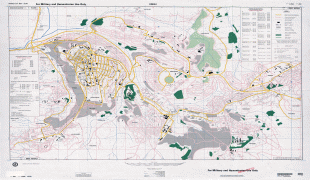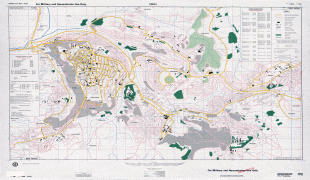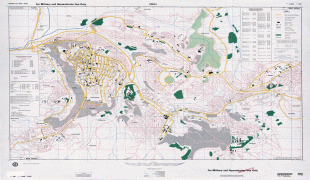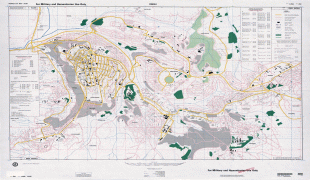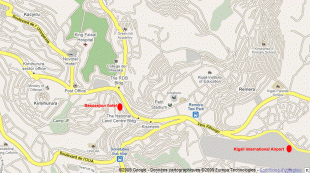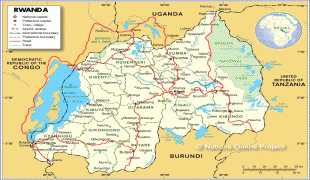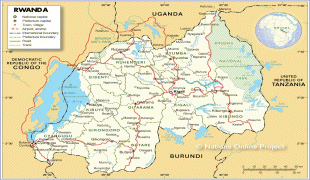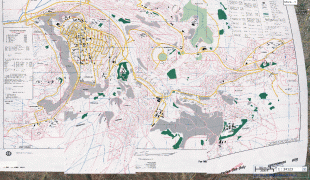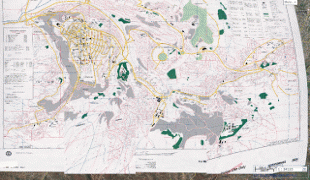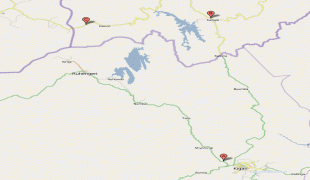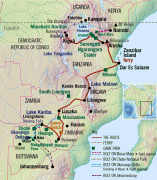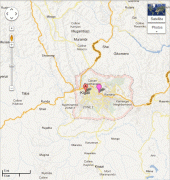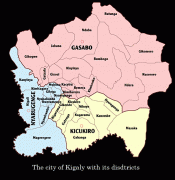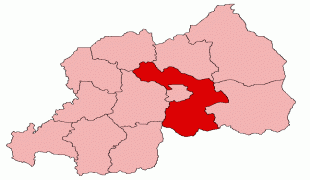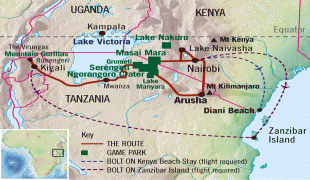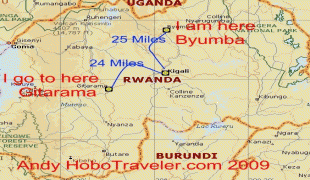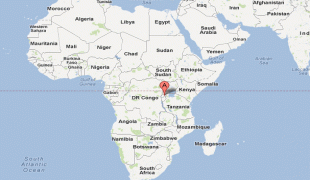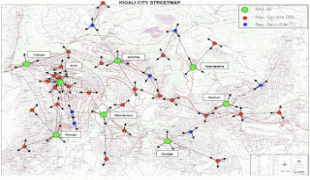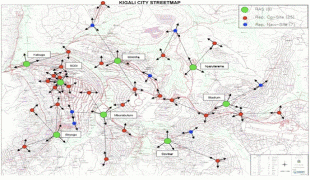Kigali
Kigali is the capital and largest city of Rwanda. It is near the nation's geographic centre in a region of rolling hills, with a series of valleys and ridges joined by steep slopes. As a primate city, Kigali has been Rwanda's economic, cultural, and transport hub since it became the capital following independence from Belgian rule in 1962.
In an area controlled by the Kingdom of Rwanda from the 17th century and then by the German Empire, the city was founded in 1907 when Richard Kandt, the colonial resident, chose the site for his headquarters, citing its central location, views and security. Foreign merchants began to trade in the city during the German era, and Kandt opened some government-run schools for Tutsi Rwandan students. Belgium took control of Rwanda and Burundi during World War I, forming the mandate of Ruanda-Urundi. Kigali remained the seat of colonial administration for Rwanda but Ruanda-Urundi's capital was at Usumbura (now Bujumbura) in Burundi and Kigali remained a small city with a population of just 6,000 at the time of independence.
Kigali grew slowly during the following decades. It was not initially directly affected by the Rwandan Civil War between government forces and the rebel Rwandan Patriotic Front (RPF), which began in 1990. However, in April 1994 Rwanda's President Juvénal Habyarimana was killed when his aircraft was shot down near Kigali. His death was followed by the Rwandan genocide, with Hutu extremists loyal to the interim government killing an estimated 500,000–800,000 Tutsi and moderate Hutu nationwide. The RPF resumed fighting, ending a cease-fire of more than a year. They gradually took control of most of the country and seized Kigali on 4 July 1994. Post-genocide Kigali has experienced rapid population growth, with much of the city rebuilt.
The city of Kigali is one of the five provinces of Rwanda, with boundaries set in 2006. It is divided into three districts—Gasabo, Kicukiro, and Nyarugenge—which historically had control of significant areas of local governance. Reforms in January 2020 transferred much of the districts' power to the city-wide council. The city also hosts the main residence and offices of the president of Rwanda and most government ministries. The largest contributor to Kigali's gross domestic product is the service sector, but a significant proportion of the population works in agriculture including small-scale subsistence farming. Attracting international visitors is a priority for city authorities, including leisure tourism, conferences and exhibitions.
The name Kigali comes from the Kinyarwanda prefix ki- combined with the adjective suffix -gali, which means wide or broad. This was originally applied to Mount Kigali, most likely because the mountain itself was broad and wide, with the city later being named after the mountain. According to Rwandan oral history, the name originated in the 14th century. Rwandan scholar Alexis Kagame, who did extensive research into the country's oral history and traditions, wrote that the name Kigali came into use after King Cyilima I Rugwe completed a conquest of the area. The legend states that Rugwe viewed the territory from the top of a hill and said burya iki gihugu ni kigali, which translates to "this country is vast".
In an area controlled by the Kingdom of Rwanda from the 17th century and then by the German Empire, the city was founded in 1907 when Richard Kandt, the colonial resident, chose the site for his headquarters, citing its central location, views and security. Foreign merchants began to trade in the city during the German era, and Kandt opened some government-run schools for Tutsi Rwandan students. Belgium took control of Rwanda and Burundi during World War I, forming the mandate of Ruanda-Urundi. Kigali remained the seat of colonial administration for Rwanda but Ruanda-Urundi's capital was at Usumbura (now Bujumbura) in Burundi and Kigali remained a small city with a population of just 6,000 at the time of independence.
Kigali grew slowly during the following decades. It was not initially directly affected by the Rwandan Civil War between government forces and the rebel Rwandan Patriotic Front (RPF), which began in 1990. However, in April 1994 Rwanda's President Juvénal Habyarimana was killed when his aircraft was shot down near Kigali. His death was followed by the Rwandan genocide, with Hutu extremists loyal to the interim government killing an estimated 500,000–800,000 Tutsi and moderate Hutu nationwide. The RPF resumed fighting, ending a cease-fire of more than a year. They gradually took control of most of the country and seized Kigali on 4 July 1994. Post-genocide Kigali has experienced rapid population growth, with much of the city rebuilt.
The city of Kigali is one of the five provinces of Rwanda, with boundaries set in 2006. It is divided into three districts—Gasabo, Kicukiro, and Nyarugenge—which historically had control of significant areas of local governance. Reforms in January 2020 transferred much of the districts' power to the city-wide council. The city also hosts the main residence and offices of the president of Rwanda and most government ministries. The largest contributor to Kigali's gross domestic product is the service sector, but a significant proportion of the population works in agriculture including small-scale subsistence farming. Attracting international visitors is a priority for city authorities, including leisure tourism, conferences and exhibitions.
The name Kigali comes from the Kinyarwanda prefix ki- combined with the adjective suffix -gali, which means wide or broad. This was originally applied to Mount Kigali, most likely because the mountain itself was broad and wide, with the city later being named after the mountain. According to Rwandan oral history, the name originated in the 14th century. Rwandan scholar Alexis Kagame, who did extensive research into the country's oral history and traditions, wrote that the name Kigali came into use after King Cyilima I Rugwe completed a conquest of the area. The legend states that Rugwe viewed the territory from the top of a hill and said burya iki gihugu ni kigali, which translates to "this country is vast".
Map - Kigali
Map
Country - Rwanda
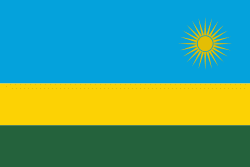 |
 |
| Flag of Rwanda | |
Hunter-gatherers settled the territory in the Stone and Iron Ages, followed later by Bantu peoples. The population coalesced first into clans, and then, into kingdoms. In the 15th century, one kingdom, under King Gihanga, managed to incorporate several of its close neighbor territories establishing the Kingdom of Rwanda. The Kingdom of Rwanda dominated from the mid-eighteen century, with the Tutsi kings conquering others militarily, centralising power, and enacting anti-Hutu policies. In 1897, Germany colonized Rwanda as part of German East Africa, followed by Belgium, which took control in 1916 during World War I. Both European nations ruled through the Rwandan king and perpetuated a pro-Tutsi policy. The Hutu population revolted in 1959. They massacred numerous Tutsi and ultimately established an independent, Hutu-dominated republic in 1962 led by President Grégoire Kayibanda. A 1973 military coup overthrew Kayibanda and brought Juvénal Habyarimana to power, who retained the pro-Hutu policy. The Tutsi-led Rwandan Patriotic Front (RPF) launched a civil war in 1990. Habyarimana was assassinated in April 1994. Social tensions erupted in the Rwandan genocide that span of one hundred days. The RPF ended the genocide with a military victory in July 1994.
Currency / Language
| ISO | Currency | Symbol | Significant figures |
|---|---|---|---|
| RWF | Rwandan franc | Fr | 0 |
| ISO | Language |
|---|---|
| EN | English language |
| FR | French language |
| RW | Kinyarwanda |
| SW | Swahili language |






